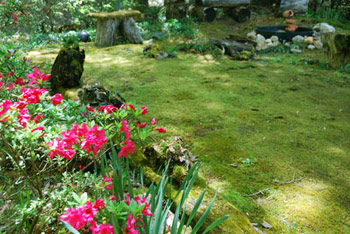Leucobryum, Hypnum, Thuidium — unless you work in an herbarium, these names may not be familiar to you. So, to clue you in (and perhaps help you out if you're ever on Jeopardy!), these are all types of bryophytes. Still confused? We're talking mosses here.

Annie Martin (aka Mossin' Annie) would have no problem on Jeopardy! if the Daily Double concerned bryophytes. The Asheville native throws around the scientific names of mosses the way we might say, "Look at my pretty daffodils."
This is partly because most mosses don't have common names, so if you're a moss gardener, you're stuck with the highfalutin ones. But it's also because Mossin' Annie is passionate about her plants.
Her lovely moss garden features 30 different species, and she knows each one intimately. Annie is the moss fairy if there ever was one (and she believes there is). Her passion for these 450-million-year-old plants (older than ferns but not lichens) is boundless. She jumps from one part of her garden to another, asking you to get down on hands and knees to see the way the Dicranum (windswept moss, one of the few that has a common name) sweeps both ways.
Slipping a small magnifying glass into your hand, Annie tells you to hold the moss up close so you can get a good look. "That tiny strand of moss is one plant," she explains, expecting you to be just as delighted as she is. You are.
Mosses, one quickly discovers are breathtakingly beautiful, simple plants. They have no vascular system, they reproduce by spores, and they're not picky about what they grow on. (To prove the point, Annie holds up a mossy old tennis shoe.) Eschewing dormancy, they grow when it's cold, and they don't require fertilizer, pesticides or mulch (in fact, they generally are the mulch). They actually like being stepped on, and you can water them at any time of day.
"Water and walk on them," urges Annie. They love the water, and walking on the mosses sets them in place. They're great for high-traffic areas.
For gardeners, there's definitely a lot to like. Moss instead of grass? According to one study, running a lawn mower (which is expensive and noisy) for one hour creates as much pollution as driving your car 100 miles. Mulch can be pricey, too, especially if you're covering a large area. Using moss saves you money, and you get green all year.

Annie's garden came about because she was sick of looking at black asphalt all winter; she wanted green. So she brought in a truckload of soil — nothing special, she says, just plain old red-clay mountain soil — and dumped it on the asphalt, maybe 2 inches thick. Adding no amendments (though, since mosses don't like lime, the pH sometimes needs adjusting), she just started planting. The end result is a wonderland of greens, grays, brilliant reds, oranges and yellows.
The moss is the garden, not the accent. For that she has a few azaleas, some ferns, a couple of dwarf evergreens and some spring bulbs. Even the bluets that had popped up and were blooming nicely were interlopers as far as Annie was concerned: They could bloom, but then they'd have to go. Other ground covers are not allowed to compete with her beloved mosses.
Annie's garden is inspiring in its beauty and simplicity, but I quickly found out that if I wanted to do one myself, it would take some study. Not to worry, though: If you're really interested, Annie can help (see below). Through her company, Mountain Moss Enterprises, she does everything from moss rescue to site consultations to workshops, and she absolutely loves to talk moss.
Annie's asphalt driveway is now a fairyland of moss; next up is her yard. She dreams of the day when she and her neighbors can simply enjoy the shade (and sun, which some mosses actually like) rather than cranking up the Weed Eaters and lawn mowers.
Come to think of it, that sounds pretty good to me too. It might give me a chance to hone my Jeopardy! skills.
To learn more about moss gardening, check out Annie's Web site (http://mountainmoss.com) or e-mail her at mossinannie@gmail.com.
Cinthia Milner lives in Leicester.
Mosses actually like being stepped on, and you can water them at any time of day.


Before you comment
The comments section is here to provide a platform for civil dialogue on the issues we face together as a local community. Xpress is committed to offering this platform for all voices, but when the tone of the discussion gets nasty or strays off topic, we believe many people choose not to participate. Xpress editors are determined to moderate comments to ensure a constructive interchange is maintained. All comments judged not to be in keeping with the spirit of civil discourse will be removed and repeat violators will be banned. See here for our terms of service. Thank you for being part of this effort to promote respectful discussion.